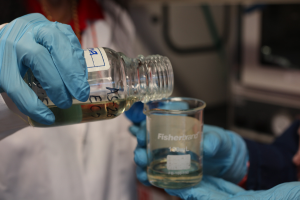Camelina Oil: Greener Packaging Solution

Camelina oil coating: A sustainable, water-resistant alternative for paper packaging.
Paper packaging is a common part of our daily lives, used for products ranging from cereal boxes to takeout containers. However, paper's porous nature makes it vulnerable to moisture, which can compromise the freshness and quality of packaged goods. To address this issue, manufacturers often apply coatings to paper packaging. These coatings are often derived from petroleum, a non-renewable resource that can add to pollution and environmental degradation. This reliance on petroleum-based coatings raises sustainability concerns and limits the recyclability.
Modified Camelina Oil: A Promising Sustainable Coating for Food Packaging
Scientists are turning to nature for sustainable solutions, with plant oils like camelina oil emerging as renewable and eco-friendly alternatives. Camelina oil, derived from Camelina sativa plant seeds, has been used for lamp oil and animal feed in the past due to its high unsaturated fatty acid content. Dr. Manjusri Misra, an engineering professor at the University of Guelph, and her team have unlocked a new potential for this versatile oil: They've developed a simple, solvent-free method to enhance its properties by grafting maleic anhydride, a molecule derived from maleic acid, onto it. Think of this process like adding tiny hooks to the oil molecules, allowing them to latch onto the paper fibers more effectively. This modification transforms the oil into a highly effective hydrophobic (water-repellent) coating, ideal for paper-based packaging. The coating not only repels water but also serves as an oxygen barrier, significantly improving the paper's ability to preserve food freshness.

The team used special tools to make sure the camelina oil had been successfully changed. Testing revealed that paper coated with the modified camelina oil showed a 94 per cent reduction in water vapor permeability compared to uncoated paper. This enhanced barrier against moisture, along with improved oxygen barrier properties, is crucial for preserving food quality and extending shelf life. The coated paper also demonstrated increased flexibility, while retaining 70 per cent of its original strength, making it a versatile and durable packaging material.
Sustainable Solution for the Packaging Industry
This research highlights the potential of plant-based materials like camelina oil to create high-performance, eco-friendly coatings. As the demand for sustainable packaging grows, these innovations can help pave the way for greener paper packaging, providing an environmentally friendly solution that maintains food quality without harming the planet.
"Our research demonstrates the potential of camelina oil as a building block for sustainable materials," says Misra. "By transforming this renewable resource into a high-performance, water-resistant coating, we've opened the door to a new era of eco-friendly packaging that can help protect our planet."
This story was written by Mojtaba Safdari as part of the Science Communicators: Research @ CEPS initiative. Mojtaba is a PhD candidate in the School of Engineering under Dr. Amir A. Aliabadi.
Funding Acknowledgement
This research is funded by the Bioeconomy Industrial Uses Research Program Theme of the Ontario Agri-Food Innovation Alliance, a collaboration between the Government of Ontario and the University of Guelph.
Reference: Arshad M, Shankar S, Mohanty AK, Todd J, Riddle R, Van Acker R, Taylor GW, Misra M. Improving the Barrier and Mechanical Properties of Paper Used for Packing Applications with Renewable Hydrophobic Coatings Derived from Camelina Oil. ACS Omega. 2024 Apr 24.